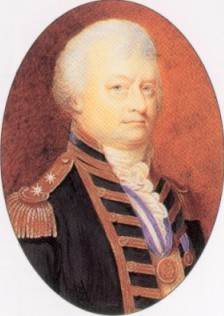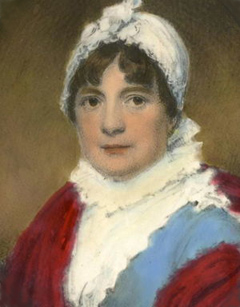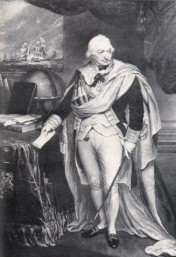THE PARKER FAMILY
Vice Admiral Sir William Parker, 1st Baronet of Harburn
1742 - 1802
Note: The above picture appears in the book, An Illustrated History of the British Navy in association with the Royal Naval Museum, Portsmouth, and is represented to be Admiral of the Fleet, Sir William Parker, Ist Baronet, of Shenstone (1781-1866). However, this picture is of Vice Admiral Sir William Parker, 1st Baronet Harburn (1743-1802), the family referred to on this webpage.
Some of the information below is from the Dictionary of National Biography.
Admiral Sir William Parker was born at Queenborough, Kent, England during 1742, and baptised there on December 26, 1742. William's parents were Augustine Parker (1711-1784) and Elizabeth Beal (1725-1754), daughter of William Beal. Augustine Parker had been a Mayor of Queenborough and a commander of one of the King's yachts.
Admiral Sir William Parker was the eldest child of Augustine Parker and his wife Elizabeth Beal. His sister Sarah Parker, was christened March 11, 1744 at Queenborough, Kent. She died unmarried December 4, 1791. A brother Augustine Parker was christened Feb 9,1746 at Queenborough. A sister, Elizabeth Parker, was born October 11, 1748 at Queenborough, Kent, England. She married William Head on July 19, 1785 in Queenborough. Two daughters were born of this marriage. A daughter named named Elizabeth Head was born February 9, 1787, and a daughter named Jane Head was born January 4, 1789, both at Queenborough, Kent, England. Another sister Susannah Parker was born in April 1750, and and died in September 1750. A younger brother, Captain Robert Parker was born April 8, 1753 and married Martha Rosewell (1756 - 1827) at Chatham, Kent, England. They had eight children who were as follows: Edmund William Parker (1783-1827), Frederick Augustus Hargood Parker (1787-1849), Louisa Collingwood Parker (1788-1829), Charles Beauclerk Sutherland Parker (1789-1827), Augusta Ann Parker (1790-1865), William Frederic Parker (1792-1865), Mary Parker born 1794, and Edward Augustus Parker (1795-1875). Captain Robert Parker was Commanding Officer on the HMS Intrepid, and died at sea on November 23, 1797.
William Parker entered the navy at a very early age, about 1756. He was on the ship, the Centurion, whose Captain was William Mantell, and was present during the capture of Louisbourg in 1758 and the capture of Quebec in 1759. After six years service as a midshipman and master's mate, he passed his examination in 1762 and by 1766 he was promoted to Lieutenant.
Jane Collingwood Parker (1740-1814)
On December 28,1766, William Parker married Jane Collingwood, the daughter of Captain Edward Collingwood, at St. Nicholas Church, Deptford, England. Jane Collingwood was born at Greenwich, England on October 14, 1740, the daughter of Edward Collingwood (1693-1779) and Jane Carlton (1712-1791).
In 1768, after some time at home in England, Lieutenant Parker returned overseas to serve off the coast of Newfoundland where he was promoted to Commander in 1773. He continued to serve in Newfoundland for a time and in 1777 he went to the West Indies where he served under Barrington and later under Byron. He served aboard various ships and as Commodore and Commander-in-Chief on the Leeward Islands station. During the 1790's he served under Admiral Richard Howe. In 1794 he was promoted to rear admiral and served in Jamaica. In 1797 Admiral Sir William Parker served under Sir John Jervis, who commanded a fleet in action against the Spaniards near Cape St. Vincent. In some of the action, Sir William Parker was on the ship Prince George. In this action, Sir John Jervis defeated a much larger Spanish fleet with his smaller fleet: "The responsibility for attacking so large a force with so few ships was his (Sir John Jervis') alone. To Jervis this was due the efficiency of the fleet under his command. At the critical moment when victory was necessary and essential to England, he put into action a scheme long planned and long prepared for, and carried it through successfully. It was a timely and a daring action, well conceived by him and splendidly carried out by the captains of the fleet and the well-trained and disciplined crews, most of whom had been long under his command and had gained their efficiency in serving under him." (page 175, The Life of John Jervis, Admiral Lord St. Vincent by Captain W. V. Anson, R.N.)
Admiral Sir John Jervis, Earl of St. Vincent
As third in command for The Battle of Cape St. Vincent in 1797, William Parker was made a baronet, and was presented with the freedom of the city of London, along with a gold medal. Sir William Parker, 1st Baronet of Harburn, ended his career as Commander-in-Chief in North America at Halifax, Nova Scotia in 1802.
William and Jane Collingwood Parker had seven daughters and one son. The daughters were named Jane, Sarah, Susanna, Harriet, Ann, Mary and Elizabeth, and the son was named William George Parker.
Jane Parker
Daughter of Sir William Parker and Jane Collingwood
Jane Parker was born August 7, 1770 at Queenborough, Kent, England, and married Captain Archibald Hamilton Roberton on July 7, 1795 at St. Alfege, Greenwich, Kent, England. They had three children. William John Roberton was born May 17, 1796 and died 1801 in his 5th year. Mary Roberton was born October 18, 1798 at the Cape of Good Hope, and died a spinster April 18, 1881 at Dawlish, Chudleigh, Devon. Emily Roberton was born April 25, 1801 and died 1836. Captain Archibald Hamilton Roberton died April 2, 1802 at Greenwich, Kent England, at the age of 38, leaving his young family. He died a few hours after his arrival from the Cape of Good Hope. Jane Parker Roberton married secondly George Cocks who was born 1770. They married August 5, 1813 at Chester Holy Trinity, Chester, Cheshire, England. George Cocks and his wife Jane had two children, Jane Catherine Cocks (1814-1837) and Georgina Cocks (1814-1828). George Cocks died March 31, 1829 at the age of 59 at Chudleigh, Devon, England. Jane Parker Cocks died August August 29, 1853 at Devon, England.
Sarah Parker
Daughter of Sir William Parker and Jane Collingwood
Sarah Parker was born March 4, 1774 at Queenborough, Kent, England and was baptised April 2, 1774 at Poole, Dorset, England. She married Joseph Bingham, Royal Navy, April 13, 1797 at Saint Martin in the Fields, Westminster, London, England. They had six children; Emma Bingham was born January 26, 1798 at Fareham Hampshire, England, and died June 2, 1879 at Yarmouth, Isle of Wight, England. Parker Duckworth Bingham was born April 11, 1799 at Fareham, Hampshire, England and died in February, 1850 at Alverstoke, Hampshire, England. Frances Wentworth Bingham was born April 30, 1801 in Halifax, Canada and died February 16, 1878 at Paddington, Middlesex, England. A son named Joseph Bingham was born September 17, 1802 at Hampshire England and died 1853. A daughter, Sarah Bingham was born June 20, 1804 at Mumbai, India and died March 15, 1856 in Toronto, Ontario, Canada. Mary Catherine Bingham was born August 25, 1809 at Chatham, Kent, England, and died February 7, 1886 at Finchley Middlesex, England. Rear Admiral Joseph Bingham R.N. was appointed Commanding Officer of the East India Station. He died December 10, 1825 at Mayfair, Middlesex, England at the age of 56. His wife, Sarah Parker Bingham died January, 1856 in Essex,England.
Susanna Parker
Daughter of Sir William Parker and Jane Collingwood
Susanna Parker was born 1775 at Queenborough, Kent, England, and baptised March 12, 1776 at St. Nicholas, Deptford, England. Susanna married William Henry Hawkwell Bowen R.N. on February 26, 1795 at St. George, Hanover Square, England. He was born 1762 at Rhoscrowther, Wales, England. They had five children; their first born was William Parker Bowen, who was baptised at Deal, Kent on May 5, 1796, William John Hawkwell Bowen was born April 30, 1796 and baptised November 30, 1797 at St. Alfege, Greenwich, England. William married Mary Elizabeth Iggulden on February 18, 1823 at Upper Deal, Kent, England. He was a Captain with the 77th Regiment of Infantry and died in Jamaica on April 3, 1825 at the age of 28. Susanna Bowen was born Sept 18, 1797 at Greenwich, Kent, England and was baptised at the same time as her brother William John Hawkwell Bowen, on November 30, 1797. She died on October 2, 1858 and was buried at All Souls, Kensal Green, England. George Meares Countess Bowen was born January 19, 1803 at Wells, Somerset, England. He died September 1, 1889 at St. Leonard's, New South Wales, Australia. Augustus Frederick James Bowen R.N. was born FEb 27, 1810 at Richmond, Surrey, England, and died October 19, 1876 at West Tamar, Tasmania, Australia.
Harriet Parker
Daughter of Sir William Parker and Jane Collingwood
Harriet Parker was born at Queenborough, Kent, England and was baptised on June 18, 1777 at St. Nicholas, Deptford, Greenwich, England. She never married and died at the age of 58. Harriet was buried at Fareham, Southampton, England on June 1, 1836.
Ann Parker
Daughter of Sir William Parker and Jane Collingwood
MaryParker
Daughter of Sir William Parker and Jane Collingwood
Elizabeth Parker
Daughter of Sir William Parker and Jane Collingwood
William George Parker
Son of Sir William Parker and Jane Collingwood
William George Parker was born August 19. 1787.He married August 29, 1808, Elizabeth Still,(born 1791), the daughter of James Charles Still of East Knoyle in County Wiltshire and Charlotte Wake. He left a large family and died a vice admiral March 24, 1848. (This information from the book "A Naval Biographical Dictionary" by W.R. O'Byrne published in 1849.) One of the daughters of William George Parker and Elizabeth Still was Fanny Catharine who married Charles Bligh in 1837 and who died in 1894. One daughter was named Clara and another daughter, Elizabeth Charlotte was born in 1816 in England. Two of the sons married in Toronto. Melville Parker married Jesse Hector in 1847 and Albert Parker married Lucy Henrietta Jennings in 1851.
Sir William Parker died December 31, 1802 at Beaufort House, his country estate at Ham, Surrey, England. He was buried in a vault in the church of St. Alfege, Greenwich, England. Jane Collingwood Parker, Sir William's wife, died in July, 1814, at the age of 73 and was buried in the vault along with her husband, at the church of St. Alfege, Greenwich, England.
Charles Edward Parker Edwards (1853-1930) was the great great grandson of Admiral Sir William Parker (1742-1802). Charles' family was unsure of his relationship to the famous Admiral when his obituary was printed after his death. This confusion may have been because Charles' parents both died when he was young. The obituary that was printed in the local paper read as follows: "Edwards: --Suddenly on the 16th, Charles Edward Parker Edwards of the Den, Christchurch, Hants. Son of John Edwards, West Indian Planter, and Great Nephew of Admiral Sir William Parker." The use of the name Parker in male lines has been carried down to the present.



 . If you wish to use any of the
information found on my website, kindly e-mail me and ask for my permission.
Content copyright Linda S. Jordan 2003 - 2025 unless otherwise
noted.
. If you wish to use any of the
information found on my website, kindly e-mail me and ask for my permission.
Content copyright Linda S. Jordan 2003 - 2025 unless otherwise
noted.